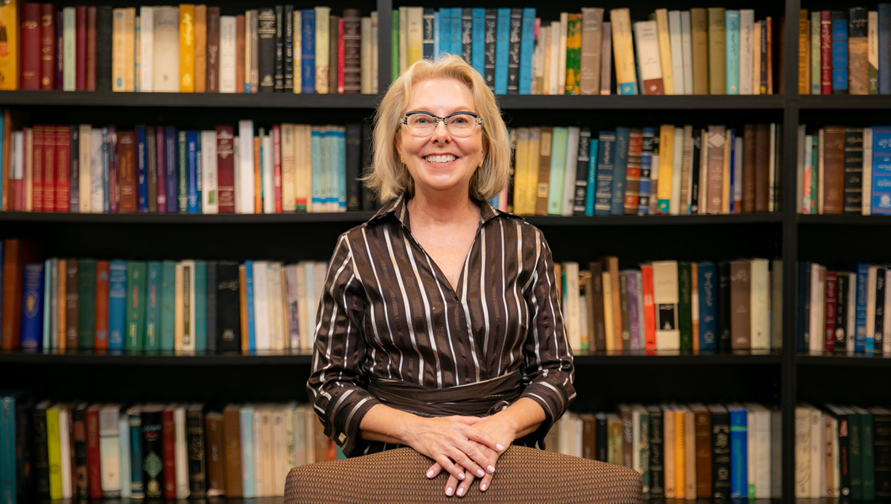
In Summer 2023, School of Humanities students interviewed first-generation humanities faculty to learn about their experiences and the different professional and personal paths they traveled on their way to UCI.
Nebraska > Bologna > Baltimore > Santa Cruz > Irvine
In this interview, Stephanie Narrow (Ph.D. History ‘23) speaks with Professor Deanna Shemek (European Languages & Studies) about her time as an undergrad at the University of Nebraska (waitressing, a lost raincoat! and the importance of making lists), seeking mentorship and pursuing your interests.
What follows is an edited version of the transcript of their in-person conversation.

Stephanie: Will you introduce yourself and where you went to college?
Deanna: I'm Deanna Shemek and I teach in European Languages and Studies, where I do mostly Italian. I specialize in the Italian Renaissance but also teach courses about European culture, both early and modern.
I went to undergraduate school at the University of Nebraska, Lincoln, and that's where I grew up. I lived at home in college, because that's all my parents could afford. We were not a family that could put their kids in a dorm or an apartment. I worked all through college, at least one job, but often two. I had to buy my own car to get to school, stuff like that. After my university years, I went to grad school at Johns Hopkins, so I moved to the East Coast. And in some ways, that was my biggest shock as a first-gen, but maybe we'll get to that later.
Juggling 2+ jobs and going to school
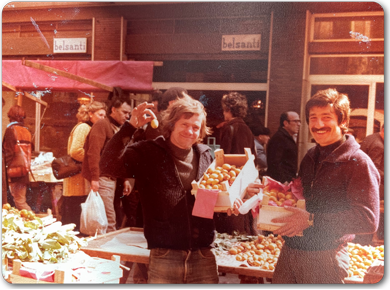
S: So I'd love to go back to when you were in college. While in your undergrad in Nebraska, you said you worked a couple of jobs. What did you do while you were in college? And do you remember how it was balancing work and school obligations?
D: I still don't quite know how I did that. I guess it was youth and energy. And I see that in my students now. They just juggle so many things. I worked in fast food,at McDonald's, and I also eventually started working at the university in the International Studies Office. That was a more interesting clerical job, I guess. Later, when I was old enough, I worked also as a waitress in a bar. The clientele was all kind of elderly, and I loved it there because they actually understood tipping, unlike the students who did not understand tipping!
S: I also worked in restaurants, in undergrad and up until I started here at UCI.
D: You know, I liked it. I think now it comes with this kind of sense that, oh, it's low paying, and oh, you know, you should be doing something that's closer to your career aspirations. And oh, you know, you only do that job if you can't get something else. But for me, it was a great release. I wasn't thinking about my schoolwork. I was talking to people, I was up on my feet. I would come home and have to elevate my feet because they were throbbing. But I just did it. I didn't think too much about it. I remember that I kept lists. I didn't yet keep a calendar, like an agenda calendar, but I had little pieces of paper that I would keep on my dresser at night. [Looking at Stephanie’s desk] Yeah, I see you have a little piece of paper! It must go with the territory. I still do that a little bit, but I keep a calendar now as well, because life is even more complicated. But I would have to-do lists every day, and I would carry those around. I was also extremely forgetful. I remember I lost my raincoat which I had saved up to buy. I left it on my chair in the library and it disappeared. So it's not like I was a super organized student. I was also pretty absent-minded and just juggling things.
Cultural adjustments, at home and abroad
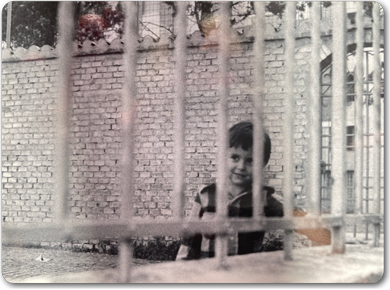
S: You mentioned earlier that it was when you went to grad school at Johns Hopkins you felt that big cultural adjustment. Was that adjustment moving from Nebraska to the East Coast or was it complicated by [the fact that] you're a first-gen student, and this is newer territory for you?
D: It was definitely the latter. I really loved my undergrad education. I majored in English, and the English department at University of Nebraska was and is really great and I feel like I got a wonderful education and preparation there.I also started taking Italian at that time. I'm backtracking a little bit, but you'll see why. One of the really fantastic things that happened to me there was that I had a lecturer who was the instructor for my Italian course. She was earning her Ph.D. at another institution, out of state, and she told me that I should study abroad. I didn't even know what that was. My family didn't know what that was. But I got all fired up about this, because she said, "You could do this, you could go abroad for a year, and you should. You have good language proficiency, you're excelling in this, you’ve got to do it." So I just took her word for it and said, "Oh, okay." And I scraped together student loans and things and my family let me go.
So, I had a fantastic year of discovery at the University of Bologna. Culture shock became interesting and exciting to me. Then I came back and I followed a path of continuing with Italian as well as finishing my English degree, and eventually applying to grad programs in Italian. It was when I got to Johns Hopkins – it wasn't so much Baltimore and the East Coast–that I had the sudden recognition that I had no cultural background for this kind of thing. Many of the students around me, had gone to a private school that had been geared toward preparing them for graduate school. So some of them, in the first year, were already writing articles for publication. That’s a little more common now, but at that time, I barely even knew that you were supposed to publish articles. I was in grad school because I wanted to continue studying. So that was just an incredible learning curve for me.
In my undergraduate years, pretty much everyone around me, it seemed, was first-gen. I didn't feel special or different, or particularly disadvantaged. Everybody was kind of discovering the university; at least that was my perception. I didn't have many friends whose parents were professionals.
The one friend I had that was really important for me, I think, in adjusting to university life as an undergrad was my best friend at the time – we're still friends. Her dad was a plant pathologist; he wasn't a teaching professor, but he worked in the agricultural labs at University of Nebraska, so he had an understanding of what you do, at the university. Her name is Christiana Langenberg and she has gone on to become a powerful educator and fiction writer. Back in the day she even helped me learn how to study in high school, because I really didn't know how to study. I'd just been a good student, intuitively, but at some point I finally had to study. She's the one who later said, "You know, before we show up, for our first day of college, we have to go and find all our classrooms. We have to locate the classrooms in the buildings on campus." Because otherwise, I don't know what I thought I was going to do – just go there? You can't do that on a university campus! Everything's spread around and your classes are in different buildings. I'd been in high school, and I knew there were a lot of buildings at the university, I had been there for this or that event, but my high school was in one building. Without her I would have been lost on my first day of classes, and I probably would have been devastated and had a really bad beginning. I owe her that. I actually need to tell her this, because. I don't think she realizes that.
“What’s this for?” Explaining college, and grad school, to parents
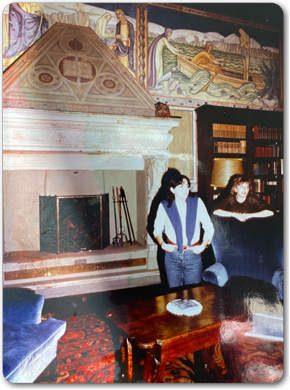
D: My parents understood next to nothing about what I was doing in college. They understood even less when I got to grad school, and would sometimes ask, "Why are you doing this? And what's it for? And are you going to get a job?" But this was the 70s, and for grad school, it was the 80s, and you went to college to better yourself. And then you figured out what you were going to do; there wasn't this anxiety about return on investment that we see today.
My parents did pay for my undergraduate education. I'm deeply grateful for that. But going to a state school at that time also wasn't so expensive as it can be today. I don't want to minimize their sacrifice, because it was enormous. They were extremely hardworking people. But it wasn't the kind of thing where you graduated with lots and lots of debt, or where parents took out second mortgages on their homes in order to pay for college. It was something that they could budget for, and make sacrifices for. I had to pay for certain expenses of my own, but they bought my books, they paid my tuition. It was a really good time to be in school because education was something that was really an end in itself. And I thought, I actually thought at that time, well, those poor students who are all majoring in business administration (which was a big major at University of Nebraska). "Those poor students, they're always thinking about business, and what they're going to do, and I'm… I'll figure it out later." Luckily, that worked out. But I understand that all students, and particularly first-gen students now, don't really have that luxury. They're thinking about what's going to come out on the other end, and how they can use their education to assure that they will be financially stable. Many of them, of course, would love to be prosperous, who wouldn't? But it’s financial stability they are working toward. Are they going to be okay?
S: I love that. You were talking about your students now, and understanding – I'm still there with you. I'm not an undergrad student, but I'm still a student. The stability thing is really something that I crave, especially as a graduate student of so many years of financial precarity. And I know that I'm not unique. It's not only graduate students, but undergrads. And I'm curious, too, it seems like you carry a lot of empathy for your students, and the ever-evolving landscape of being a student in this increasingly precarious higher education landscape. Are there things – anything about your experiences in graduate school or undergrad, or being a first-gen student or from your own family or personal background – that shapes how you mentor or how you teach to current students?
D: Yes, absolutely. I am very keen to impress upon my students that they earned their way here, through their grades and their accomplishments. That they have every right to be here, that they belong here. That they didn't somehow get in by accident, you know, and that they're not alone in not fully understanding a complex institution. Let's just demystify it.
Seek mentorship – now, and often
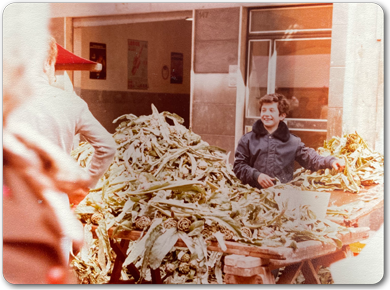
D: I just had a conversation recently with a student who came in from one of my classes and told me that he had applied for graduate school, all by himself, because he didn't know that you could ask faculty to help you. He got letters of recommendation, but no faculty guidance. This talented student got into four master's programs, but this was basically the first advising session that he had had with a professor about how to sort those out, and what would be the advantages and disadvantages of each. For Master's degrees, you're often not getting financial aid, so, the cost of the programs versus the benefits and the ability of those programs to not leave the student in debt is important to consider. I relish those kinds of conversations, because I didn't really have them as a student, either. Somebody encouraged me to go to grad school and I remember getting some basic advice, but that was it.
Actually, one thing I cringe about when I think about it is my statement of purpose in my application for grad school, because it was very naive. But somebody saw something in my application, nd I know who it was, and I'm eternally grateful to that person, too, because he gave me a chance. But I can help students to understand better that type of document. It's a genre, your statement of purpose. What are your academic goals? The student’s first reaction is often, and understandably, "I don't know, I don't have a project in mind that I want to do six years from now, when I'm approaching a doctoral dissertation." So we have conversations about interests. Where have you been gravitating? What do you want to explore? You don't have to have your life planned out. But you have to look like somebody who has a sense of direction and a capacity to focus. You've obviously done very well, Stephanie. I don't know if you had that kind of experience, if you got mentoring. But mentoring for me, for students, all students really, is crucial. It’s a crucial part of my role, and I love it, because students respond immediately to it. It's useful.
S: So it seems like – this is me putting words into your mouth, so please interrupt. But, it seems like a big piece of advice that you have for current students who are considering the transition from undergrad to grad school is to seek help or to seek mentorship.
D: Yes, seek mentorship. Another student in the same class has come to see me once already for office hours. I think she told me she is first-gen, too; she has understood that going to faculty office hours is key, so she makes a regular practice of it. She's coming in again today, just to touch base. Great idea. It's astonishing how few students use office hours for anything other than negotiating a last-ditch effort to save an exam or make up a quiz. That is always worth inquiring about, of course. Never just assume that there's no hope for you, that you missed that deadline or whatever, and even though you have something huge going on in your life that really should justify an accommodation, you're not going to ask because the syllabus says “no makeup exams” or something like that. Always make sure that you have exhausted your opportunities. But that's when you're in an emergency, or when you have something very specific that you need.
It's a great idea to just go introduce yourself to your professor. It makes a huge difference in how the professor can understand who's in the room, and how the professor can remember you. I don't like the language of "barrier breaking," because it's overused, but little barriers between the faculty, the teaching and the learning, kind of dissolve if there's also conversation in slightly less formal settings. You figure out a lot about each other.
S: Yeah, when I was in coursework – in undergrad, Master’s and Ph.D.– I made it my personal goal to go to my professors’ office hours at least once a quarter. I would try to find a text or maybe one of our assigned readings or an assignment to go and have that be the reason for my visit. And I really do think it helps.
You asked me earlier about mentorship for myself, too, between graduate school and undergraduate. Is there a piece of advice or some sort of wisdom that you would give your younger self, if you could go back and talk to early-20s Deanna, on the precipice of starting undergrad or transitioning from undergrad to graduate school?
D: It's really about confidence and keeping in touch with yourself to acknowledge your own intelligence, accomplishments and worthiness. Because, also in undergrad, but especially if you're going to grad school, you get knocked off your pedestal all the time,. You went there, as, maybe, a top student from your undergraduate institution, but now you're surrounded by other top students, and you're always measuring yourself against them. And this is so bad because it paralyzes you. I would say, give yourself some slack and remind yourself that you are worthy of being there, that you deserve it, that you have something to give to your classmates, to your field; and you're already giving it. I think for some students, this already is relevant advice at an undergraduate level, too.
S: I love that. So I want to be respectful of your time. I know you have a student coming in. So the last question: Thinking back specifically to your undergrad days, is there some memory that pops out to you? And it could be something like, I remember my best friend and I trying to find our classes on the first day of school, or I loved grabbing coffee at this place and studying for finals. Is there any particular salient memory that springs to mind when thinking about your undergrad days?
D: There are a few of them, and they might mark my distance from today’s students. In my student days, it was pretty common for faculty to have their students over at the end of the term or for a special event, for example in classes with professors in the English department where the group was normally small because class sizes were more limited than they are today. I remember I took a class on Irish literature, and the professor had us all over for St. Patrick’s Day. The legal drinking age at the time was 18, so we could have Irish stew and drink Guinness and sit around talking about James Joyce and Yeats. And, you know, it was just really nice. So those are things that I treasure. his would happen also with our TAs. I remember my French class TA would have students over for potlucks, and those were international occasions, also because she was hanging out with a group of exchange of students from India: that's when I first tasted Indian food! Those kinds of things I recall with great pleasure.
When you asked me that question, something popped into my head that made me remember a place where I used to go to study. There was a women's lounge in the student union, which is kind of like the student center here. It was a wonderful old building, and it had a women's lounge with old-fashioned sofas in it, you know, with tapestry upholstery. God knows how many people had sat on that and eaten their lunch and whatever. But I used to like to go it here. It was this quiet, all-female space where I would bring my tea and read and do my homework for a couple hours, once or twice a week if my schedule permitted it.. I'm sure students have those favorite study spaces now, but that was mine, and it did not require me to buy an expensive coffee in order to sit there.
S: I love that. Well, thank you so much for that. This was a wonderful conversation.
D: It was for me, too. Thanks, Stephanie.
S: So much of what you said resonated with me and my experience as a first-gen student at undergrad and graduate level. And so I can only imagine that other people, when reading or listening to this, will connect in the same way. So thank you so much for your time.
D: You're welcome. You've made me think that this kind of conversation is really relevant for the grad students, too. I hope that the sweep of the first-gen project will go beyond undergrads because we're surrounded by grad students, too, including yourself.
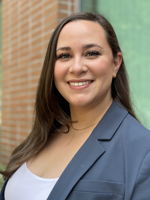
Stephanie Narrow earned her Ph.D. in History from the University of California, Irvine in 2023. She is the co-editor, alongside Vicki L. Ruiz, Judy Tzu-Chun Wu, and Kim Cary Warren, of the 5th Edition of Unequal Sisters (Routledge, 2023). Stephanie is an active public historian, with research focusing on the role of 19th-century print media and diplomacy in facilitating trans-imperial constructions of race between the British and American empires.
